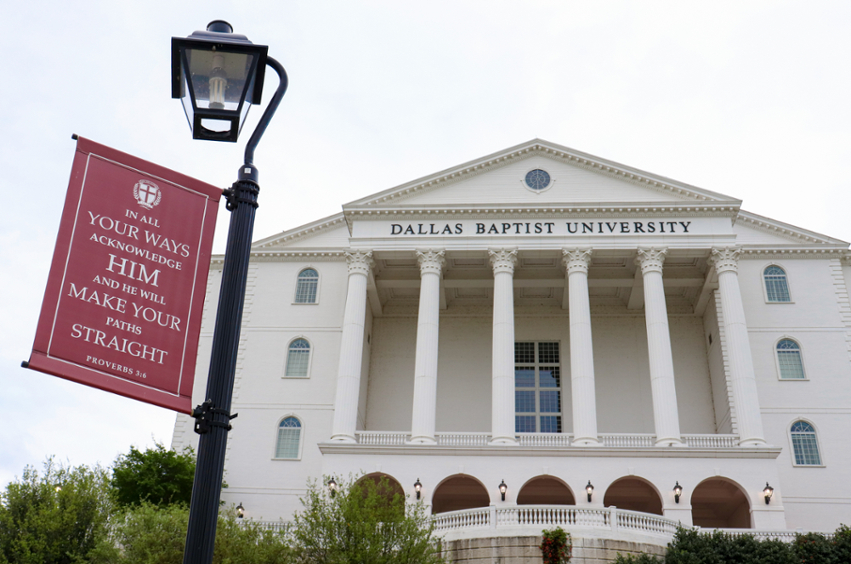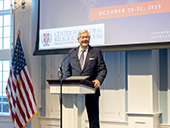Humility: The Heart of Servant Leadership
This article is over six months old and may reference former titles for DBU faculty or staff, discontinued programs, or other details that have since changed. If you have any questions, please contact us at news@dbu.edu, or (214) 333-5172.

Updated: May 12, 2025
"But Jesus called them to Him and said, 'You know that the rulers of the Gentiles lord it over them, and their great ones exercise authority over them. It shall not be so among you. But whoever would be great among you must be your servant'." - Matthew 20:25-26.
What is Servant Leadership? Why is Servant Leadership at the Heartbeat of DBU?
At the core of the DBU mission is the goal to produce "servant leaders" — graduates who will take the Spirit of Christ out into the world and bring glory to God by transforming their various spheres of influence.
But what is "servant leadership," and why is it the heartbeat of all that we do here at DBU?
The term servant leadership is commonly attributed to Robert Greenleaf's influential book The Servant as Leader, which was published in 1970. Greenleaf did not write from a distinctively biblical or even generally religious perspective, yet his idea that "Good leaders must first become good servants" spurred conversations among professionals and academics, both Christian and non, about a new theoretical frame for leadership—especially in light of the increasing public failings of leaders across the spectrum.
Practicing Servant Leadership
Many leaders seek to lead their teams well and can choose from a variety of leadership styles including servant leadership. Servant leadership is practiced today at many top global companies, including Whole Foods Market, Nordstrom, Starbucks, and Marriott International, among others. While it is defined by providing top-quality care and service to customers and clients, its novelty is in adopting a more employee-oriented approach from within. Rather than being leader-focused as in organizations of times past, servant leaders serve their employees by empowering them with value and purpose, enabling them to realize their full potential in the process of reaching an organization's envisioned goals. This increases their buy-in and, subsequently, can boost overall effectiveness. As a result, employees feel seen, valued, empowered, capable, and able to make decisions in their roles.
Even before Greenleaf, as early as 1916 and at the height of American industrialization, Professor Walter Rauschenbusch spoke of a need for "serviceable leadership" in business and politics as well as in churches. However, unlike Greenleaf, Rauschenbusch's point of reference was the perfect model of servant leadership: Jesus Christ.
DBU first-year and transfer students start their academic journey during SWAT, where students have a dedicated day to serving at a local nonprofit in the DFW metroplex. From day one, DBU students are challenged to live out servant leadership daily, which helps them grow as leaders in their sphere of influence. DBU's degree programs have at least one service-learning component, integrating academic instruction, community service, and faith-based reflection. Service-learning experiences occur in various places, including churches, service organizations, schools, and businesses. Students also serve as part of service-focused student organizations, sororities, and fraternities. They engage with many community service partners across the Dallas Fort Worth Metroplex. Many DBU students also serve locally and abroad, reaching every corner of the world.
Among several bronze statues on the DBU campus is one of Jesus' washing Peter's feet by Max Greiner. This stunning display of humility of the Son of God down on His knees and cleaning the dirt-trodden feet of His followers visualizes the essential character trait of servant leadership. Jesus is the perfect example of what it means to lead by serving, and if we want to see servant leadership in action, we must study His life, observe His priorities, and watch how He relates to God and with others along the way, learning from His commitment and compassion. Having visuals around the DBU campus, helps the DBU family remember what true servant leadership looks like biblically.
Humility Toward God
A true servant leader is one who is humble first toward God in obedience to the First and Greatest Commandment: "You shall love the Lord your God with all your heart, soul, mind and strength." Regardless of whether it is a business, church, or NGO, a leader is ultimately accountable to the God of all creation. There are plenty of examples in history of bad leaders who have wielded power selfishly over others as if they were their own gods, but leadership under the authority of God is properly viewed as a stewardship for others.
Contrary to our natural human ambition for self-glory, from the moment of His descent in the incarnation to His sacrificial death on the cross, Jesus modeled a voluntary humility toward the Father in perfect steadfastness and commitment to the Father's rescue mission through many sufferings, trials, and tests.
As Jesus prayed in the midst of his nighttime agony in the Garden of Gethsemane, "Not my will, but Thine be done," humility always begins with recognizing that our lives are stewardship and responsibility to be lived wholly for God's purposes.
Humility Toward Others
The Second Greatest Commandment, "You shall love your neighbor as yourself," is related to and flows out from the First. A servant leader is one who honors others.
Leadership is a complex dynamic of relationships between leaders and followers joined together for a common purpose. Financial, political, or ministry "success" is not faithful if it lacks moral integrity and is at the expense of using people as objects rather than honoring them as sacred creations worthy of dignity. For leaders, this means that as they guide an organization or church toward its mission, they are not prideful or self-seeking but empower others to feel valued through encouragement and with a focus on developing their fullest potential.
Jesus commissioned a team of co-leaders to share in His work and spent three intentional years of His ministry caring, preparing, and equipping them with truth and grace. Jesus prioritized human relationships in the work He was called to do as men and women made in the image of God and precious to His ministry of redemption.
The late Henri Nouwen, in his book In the Name of Jesus: Reflections on Christian Leadership, says it this way:
It seems easier to be God than to love God, easier to control people than to love people, easier to own life than to love life.Jesus asks, "Do you love me?" We ask, "Can we sit at your right hand and your left hand in the Kingdom?" (Matthew 20:21).Ever since the snake said, "the day you eat of this tree your eyes will be open, and you will be like gods, knowing good and evil" (Genesis 3:5), we have been tempted to replace love with power. Jesus lived that temptation in the most agonizing way from the desert to the cross.
There is simply no servant leadership without love, and there is no love without humility - before God first and toward others second—in imitation of Jesus.
Recommended Readings
- Henri J. M. Nouwen. In the Name of Jesus: Reflections on Christian Leadership.
- Walter Rauschenbusch. "Leadership for Service." In Social Principles of Jesus.
- Oswald Sanders. Spiritual Leadership: Principles of Excellence for Every Believer.
- C. Gene Wilkes. Jesus on Leadership: Timeless Wisdom on Servant Leadership.
Dr. Michael Whiting is an Assistant Professor of Christian History and Leadership in the Cook School of Leadership at Dallas Baptist University. He also served as the Director of Written Content in University Communications.








